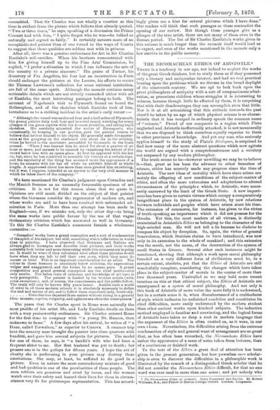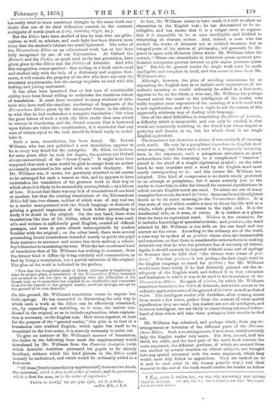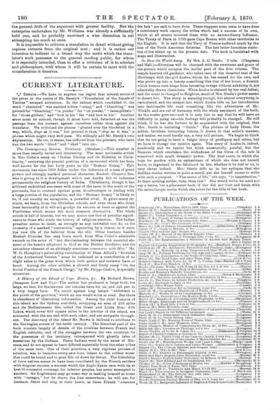THE NICOMA.CHEAN ETHICS OF ARISTOTLE.* THERE is a tendency in
our age, not indeed to neglect the works of the great Greek thinkers, but to study them as if they possessed only a literary and antiquarian interest, and had no real practical bearing upon the problems which we discuss in the broad daylight of the nineteenth century. We are apt to look back upon the great philosophers of antiquity with a sort of compassionate admi- ration, as precocious children whose struggles it is interesting to witness, because though little be effected by them, it is surprising that with their disadvantages they can accomplish even that little. Nor is it at all astonishing that this attitude towards the past should be taken by an age of which physical science is so charac- teristic that it has usurped in ordinary speech the common name of "science." Proud of our conquests in a region which Plato neglected and Aristotle ineffectually attacked, it is not unnaturally that we are disposed to think ourselves equally superior to them in other provinces of knowledge. And yet any man who seriously applies himself to the study of Plato's Diulogues, is surprised to find how many of the more abstract questions which now agitate the world are argued with a comprehensiveness and a subtlety not surpassed by any modern philosopher.
The truth seems to be—however unwilling we may be to believe it—that, great as has been the advance in other branches of science, ethics has scarcely made any progress since the time of Aristotle. The new ideas of morality which have since arisen are mainly the offspring of new conditions of the subject-matter of ethics, and often the mere extensions and adaptation's to altered circumstances of the principles which, to Aristotle, were neces- sarily narrowed by the limit of the Greek State. A new import- ance has been given to certain virtues which occupy a comparatively insignificant place in the system of Aristotle, by new relations between individula and peoples which have arisen since his time. The extension of commerce, for instance, has given to the.virtue of truth-speaking an importance which it did not possese for the Greeks. Yet this, the most modern of all virtues, is distinctly enunciated in Aristotle's Ethics as belonging to the character of the high-minded man. He will not tell a lie because he disdains to compass his object by deception. So, again, the virtue of general benevolence, which Stoicism claims to have introduced, was new only in its extension to the whole of mankind ; and this extension was the result, not the cause, of the destruction of the system of small States in Greece. Several other such instances might be mentioned, showing that although a work upon moral philosophy founded on a very different form of civilization must be, to a certain extent, obsolete, yet that the Ethics of Aristotle are still wonderfully complete, considering the changes which have taken place in the subject-matter of morals in the course of more than two thousand years. Unrivalled as we may hold more recent treatises on this or that ethical subject, the Ethics of Aristotle are unsurpassed as a system of moral philosophy. And not only is this book of Aristotle of more value the more fully it is understood, but in a certain sense it is, when disembarrassed of a crabbedness of style which indicates its unfinished condition and constitutes its chief difficulties, more easily understood by the modern student than other ancient works upon kindred subjects. The inductive method employed is familiar and convincing, and the logical forms of Aristotle have taken so deep a root in modern language that the argument of the Ethics is often carried on, as it were, in our own idiom. Nevertheless, the difficulties arising from the extreme condensation of style and general want of arrangement are so great that, as has often been remarked, the Nicomachean Ethics have rather the appearance of a mass of notes taken from lectures, than of a continuous or finished work.
To the text of the Ethics a great deal of attention has been given in the present generation, but how powerless mere scholar- ship is even to discover the difficulties in a philosophic work is illustrated by the remark of a distinguished Greek scholar that he did not consider the Nicomachean Ethics difficult, for that no one word was ever used in more than one sense ; and yet nobody who The Nieomachean Ethics of Aristotle. Nasty Translated into English. By Robert Williams, B.A., and Fellow of Merton College, Oxford. London: Longinsdis.
has really tried to trace consistent thought in the same work can doubt that one of its chief difficulties consists in the constant
ambiguity of words (such as 064, cadd4614, viX,111, &c.)
But the Ethics have been studied of late by men who are philo- sophers as well as scholars, and such light has been thrown upon them that the student's labours are much lightened. The value of the 1Vicomachean Ethics as an educational work has at last been fully recognized by one of our Universities. At Oxford the Rhetoric and the Poetics, so much read in the last generation, have given place to the Ethics and the Politics of Aristotle. And with this recognition comes another : that so long as a book can be read and studied only with the help of a dictionary and copious foot- notes, it will remain the property of the few who have not only the necessary acquirements, but the energy requisite to read with this halting and jolting movement.
It has often been lamented that so few men of considerable ability have been found willing to undertake the thankless labour of translation. It must have occurred to many students of Aris- totle who have read the excellent renderings of fragments of the Nicomachean Ethics given by Sir Alexander Grant in his edition, to wish that he had undertaken a complete translation ; but when the great labour of such a work, the little credit that men attach to success in translation, and the liberal censure that is bestowed upon failure are taken into consideration, it is wonderful that any man of talents equal to the task should be found ready to under- take it.
Such a man, nevertheless, has been found. Mr. Robert Williams, who has just published a new translation, appears to be in every way fitted for the enterprise. He filled, we believe, for some years after he took his degree, the position (at Oxford always monarchical) of the "Great Coach." It might have been supposed that such a man would be glad to escape from an author necessarily associated in his mind with so much drudgery. But Mr. Williams was, it seems, too genuinely attached to his master to be estranged for such a reason as this, and he appears to have undertaken the translation of his greatest work in that way in which alone it is likely to be successfully accomplished,— as a labour of love. It is not that there was any lack of translations of one kind or another, but that the existing translations of the Nicomachean Ethics fell into two classes, neither of which were of any real use to a reader unacquainted with the Greek language or desirous of gaining a general impression of the book before proceeding to study it in detail in the original. On the one hand, there were translations like that of Dr. Gillies, which whilst they were read- able and written in sufficiently good English, evaded all difficult passages, and were in parts almost unrecognizable by readers familiar with the original ; on the other hand, there were several painstaking literal translations intended merely to guide the pupil from sentence to sentence and secure him from making a school- boy's blunders in translating the text. With the last-mentioned kind of translation that of Mx. Williams has nothing in common ; from the former kind it differs by being scholarly and conscientious, in fact by being a translation, not a partial imitation of the original. The plan of the work is indicated in the preface.
"Now that the thoughtful study of Greek philosophy is beginning to take its proper place, a translation of the Nicontachectn Ethics, intended not so much to aid the tyro in grappling with the difficulties of the Greek text, as to reproduce the original in an intelligible and connected form for the benefit of the general reader, needs no apology, except on the ground of its own demerits."
On this ground, Mr. 'Williams's translation seems to require but little apology. He has succeeded in discovering the only way in which such a work as the Ethics can be effectively translated, viz., by expanding and unfolding, as it were, the matter con- densed in the original, so as to include explanation, when explana- tion is neoessary, in the English text. How much superior, at least for the purpose of the "general reader," this plan is to that of a translation into crabbed English, which again has itself to be translated in the foot-notes, it is scarcely necessary to point out. To give an instance of Mr. Williams's manner of translation, the italics in the following lines mark the supplementary words introduced by Mr. Williams from the Posterior Analytics (with which Aristotle doubtless presumed his pupils to be already familiar), without which the brief phrases in the Ethics could scarcely be understood, and which would be ordinarily added in a foot-note.
"Of these [truths immediately apprehended] there are two kinds, the universal, which is first in the order of nature, and the particular, which is first for man, or in the order of experience."
Eth., i. 4, 6. 1 tion Is not very obvious.
In fact, Mr. Williams seems to have made it a rule to allow no obscurities in the English text ; he has determined to be in- telligible, and has shown that it is a vulgar error to suppose that it is impossible to be at once intelligible and faithful in translating an obscure author. And, indeed, a man who has studied the works of Aristotle not as isolated treatises, but as integral parts of his system of philosophy, will generally be dis- posed to agree with Heinsius (from whom Mr. Williams takes his motto), "Minus ease obscuritatis in Aristotele quam optarent pro- lixissitni iuterprettss quorum interest Ile plus sapiat juveutus quani ipsi." But for the general reader the single work must be made intelligible and complete in itself, and this seems to have been Mr. Williams's aim.
Although, however, the plau of avoiding annotations by so expanding the English text as to include such explanations of the author's meaning as would ordinarily be added in a foot-note, appears to be, on the whole, a wise oue, Mr. Williams has perhaps trusted rather too much to the intelligence of the reader, who really requires some exposition of the meaning of words used with a new signification, and who has a right to ask the reason of this apparently arbitrary way of dealing with language.
One of the chief difficulties in translating the Ethics of Aristotle, a difficulty which is insuperable and can only be evaded, is that words are constantly recurring in the Greek text whose import is perfectly well known to us, but for which there is no single English equivalent.
The translator has therefore a choice of two metho ls of treating such words. He may by a paraphrase reproduce in English their exact meaning ; but when such a word is a frequently recurring term in the argument, such a paraphrase introduces as much awkwardness into the reasoning as a complicated " function " placed in the stead of a simple algebraical symbol ; on the other hand, he may translate such a word by the English word most nearly corresponding to it ; and this course Mr. Williams has adopted. This kind of compromise is no doubt wisely preferred to an attempt at paraphrase, but it seems scarcely just to the reader to leave him to infer for himself the unusual significatious in which certain English words are used. To select one out of many examples that occur, the word ppOvnai;; there can be not the slightest doubt as to its exact meaning in the Nicomuchean Ethics. It is that state of mind which enables a man to direct his life well as a whole, which points out the means to the right end. It is the intellectual side, as it were, of virtue. It is evident at a glance that we have no equivalent word. 1Visdont is too extensive, for it includes knowledge of speculative truth; and prudence, the word selected by Mr. Williams, is too wide on the one haud and too narrow on the other. According to the ordinary use of the word, a man may be spoken of as prudent whose vices are innumerable and notorious, so that there is considerable awkwardness in making Aristotle say that he who has prudence has of necessity all virtues.
Again, it should scarcely be imputed without some sort of apology to Socrates that he held that ".the virtues were forms of pru-
dence." Not that prudence is not perhaps the best single word in the English language to stand for itp6141an ; but Mr. Williams would have done wisely if he had distinctly pointed out the in- adequacy of the English word, and defined it in that extension and limitation in which it was to be used in his translation of the Nicomachean Ethics. So again of wisdom, by which Mr. Williams sometimes translates the crapia of Aristotle, and which covers in its ordinary application some of the ground of ;14;mm; as well as that of dupla. 'Me intelligent reader will doubtless, after coming across these words a few times, gather from the context iz what special signification they are used ; but readers are not all intelligent, and however intelligent, are not likely to resent being informed before- hand of that which will take them perhaps a little trouble to find out.
Mr. Williams has refrained, and perhaps wisely, from any re- arrangement or inversion of the different parts of the Nicoma-
cheau Ethics. Such a re-arrangement, if well done, would certainly help the English reader very much. The first, second, half the third, the sixth, and the later part of the tenth book contain the main argument, the different portions of which are severed from one another by several treatises on ethical subjects, not brought into any special relevancy with the main argument, which they would most fitly follow as appendices. They are tacked on to it and to each other in the loosest possible way,t and their removal to the end of the book would enable the reader to follow
t E.g., ACE1-a he rarera (sc., 7a Irepi axpacria5) rEp1 91?.ia; Tali's-a he hers-;' rez itsir yap iaa, 14 he r50.-Ac7.4. W,:ronjav brE).Aiir. NIc. Eth., sliL, 1,1. One is forced to ask why ? The connec
the general drift of the argument with greater facility. But the enterprise undertaken by Mr. Williams was already a sufficiently bold one, and he probably exercised a wise discretion in not attempting too much at once.
It is impossible to criticize a translation in detail without giving copious extracts from the original text ; and it is rather our intention to indicate in a broad way the merit which the trans- lator's work possesses to the general reading public, for whom it is especially intended, than to offer a criticism of it to scholars and philosophers, with whom it will be certain to meet with the consideration it deserves.




































 Previous page
Previous page